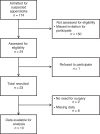Perioperative water and electrolyte balance and water homeostasis regulation in children with acute surgery
- PMID: 36759747
- PMCID: PMC9909148
- DOI: 10.1038/s41390-023-02509-1
Perioperative water and electrolyte balance and water homeostasis regulation in children with acute surgery
Erratum in
-
Correction: Perioperative water and electrolyte balance and water homeostasis regulation in children with acute surgery.Pediatr Res. 2024 Apr;95(5):1382. doi: 10.1038/s41390-023-02975-7. Pediatr Res. 2024. PMID: 38114610 Free PMC article. No abstract available.
Abstract
Background: Hospital-acquired hyponatremia remains a feared event in patients receiving hypotonic fluid therapy. Our objectives were to assess post-operative plasma-sodium concentration and to provide a physiological explanation for plasma-sodium levels over time in children with acute appendicitis.
Methods: Thirteen normonatremic (plasma-sodium ≥135 mmol/L) children (8 males), median age 12.3 (IQR 11.5-13.5) years participated in this prospective observational study (ACTRN12621000587808). Urine was collected and analyzed. Blood tests, including renin, aldosterone, arginine-vasopressin, and circulating nitric oxide substrates were determined on admission, at induction of anesthesia, and at the end of surgery.
Results: On admission, participants were assumed to be mildly dehydrated and were prescribed 50 mL/kg of Ringer's acetate intravenously followed by half-isotonic saline as maintenance fluid therapy. Blood tests, urinary indices, plasma levels of aldosterone, arginine-vasopressin, and net water-electrolyte balance indicated that participants were dehydrated on admission. Although nearly 50% of participants still had arginine-vasopressin levels that would have been expected to produce maximum antidiuresis at the end of surgery, electrolyte-free water clearance indicated that almost all participants were able to excrete net free water. No participant became hyponatremic.
Conclusions: The use of moderately hypotonic fluid therapy after correction of extracellular fluid deficit is not necessarily associated with post-operative hyponatremia.
Impact: Our observations show that in acutely ill normonatremic children not only the composition but also the amount of volume infused influence on the risk of hyponatremia. Our observations also suggest that perioperative administration of hypotonic fluid therapy is followed by a tendency towards hyponatremia if extracellular fluid depletion is left untreated. After correcting extracellular deficit almost all patients were able to excrete net free water. This occurred despite nearly 50% of the cohort having high circulating plasma levels of arginine-vasopressin at the end of surgery, suggesting a phenomenon of renal escape from arginine-vasopressin-induced antidiuresis.
© 2023. The Author(s).
Conflict of interest statement
R.T.K. declares that he is employee of Swedish Orphan Biovitrum AB (Sobi™), which had no role in funding, study design, data collection and analysis, decision to publish, or preparation of the manuscript. All other authors declare that there are no relevant financial or nonfinancial competing interests to report.
Comment in
-
Intravenous fluid therapy.Pediatr Res. 2023 Oct;94(4):1261-1262. doi: 10.1038/s41390-023-02635-w. Epub 2023 May 3. Pediatr Res. 2023. PMID: 37138024 No abstract available.
References
-
- Feld, L. G. et al. Clinical practice guideline: maintenance intravenous fluids in children. Pediatrics142, e20183083 (2018). - PubMed
Publication types
MeSH terms
Substances
LinkOut - more resources
Full Text Sources


